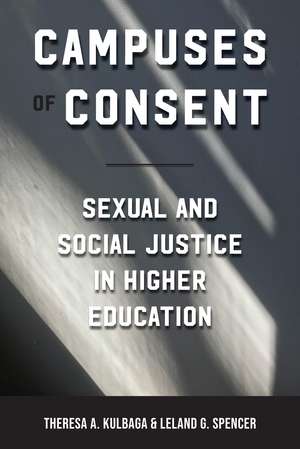Campuses of Consent: Sexual and Social Justice in Higher Education
Autor Theresa A. Kulbaga, Leland G. Spenceren Limba Engleză Paperback – 20 sep 2019
Winner of the 2020 OSCLG Outstanding Book Award
This new book for scholars and university administrators offers a provocative critique of sexual justice language and policy in higher education around the concept of consent. Complicating the idea that consent is plain common sense, Campuses of Consent shows how normative and inaccurate concepts about gender, gender identity, and sexuality erase queer or trans students' experiences and perpetuate narrow, regressive gender norms and individualist frameworks for understanding violence.
Theresa A. Kulbaga and Leland G. Spencer prove that consent in higher education cannot be meaningfully separated from larger issues of institutional and structural power and oppression. While sexual assault advocacy campaigns, such as It's On Us, federal legislation from Title IX to the Clery Act, and more recent affirmative-consent measures tend to construct consent in individualist terms, as something "given" or "received" by individuals, the authors imagine consent as something that can be constructed systemically and institutionally: in classrooms, campus communication, and shared campus spaces.
This new book for scholars and university administrators offers a provocative critique of sexual justice language and policy in higher education around the concept of consent. Complicating the idea that consent is plain common sense, Campuses of Consent shows how normative and inaccurate concepts about gender, gender identity, and sexuality erase queer or trans students' experiences and perpetuate narrow, regressive gender norms and individualist frameworks for understanding violence.
Theresa A. Kulbaga and Leland G. Spencer prove that consent in higher education cannot be meaningfully separated from larger issues of institutional and structural power and oppression. While sexual assault advocacy campaigns, such as It's On Us, federal legislation from Title IX to the Clery Act, and more recent affirmative-consent measures tend to construct consent in individualist terms, as something "given" or "received" by individuals, the authors imagine consent as something that can be constructed systemically and institutionally: in classrooms, campus communication, and shared campus spaces.
Preț: 212.13 lei
Nou
Puncte Express: 318
Preț estimativ în valută:
40.60€ • 41.84$ • 34.28£
40.60€ • 41.84$ • 34.28£
Carte tipărită la comandă
Livrare economică 03-17 martie
Preluare comenzi: 021 569.72.76
Specificații
ISBN-13: 9781625344595
ISBN-10: 1625344597
Pagini: 184
Ilustrații: 5 b&w illus.
Dimensiuni: 152 x 229 x 25 mm
Greutate: 0.31 kg
Ediția:First Edition
Editura: University of Massachusetts Press
Colecția University of Massachusetts Press
ISBN-10: 1625344597
Pagini: 184
Ilustrații: 5 b&w illus.
Dimensiuni: 152 x 229 x 25 mm
Greutate: 0.31 kg
Ediția:First Edition
Editura: University of Massachusetts Press
Colecția University of Massachusetts Press
Notă biografică
THERESA A. KULBAGA is associate professor of English at Miami University. LELAND G. SPENCER is associate professor of interdisciplinary and communication studies at Miami University.
Recenzii
"The authors actively construct a vision of consent based in respect for and trust in all students'—but particularly marginalized students'—abilities to make their own decisions, set their own boundaries, and contribute meaningfully to intellectual life."—Clare Daniel, author of Mediating Morality: The Politics of Teen Pregnancy in the Post-Welfare Era
"Campuses of Consent offers a cogent and insightful critique, while also providing plenty of recommendations for alternative ways of communicating, teaching, and administering a university. Providing both is not easy to do, and it certainly is not required of feminist scholarship, so the fact that the authors achieve it is really a gift to readers."—Sarah Projansky, author of Spectacular Girls: Media Fascination and Celebrity Culture
"Campuses of Consent offers a cogent and insightful critique, while also providing plenty of recommendations for alternative ways of communicating, teaching, and administering a university. Providing both is not easy to do, and it certainly is not required of feminist scholarship, so the fact that the authors achieve it is really a gift to readers."—Sarah Projansky, author of Spectacular Girls: Media Fascination and Celebrity Culture


